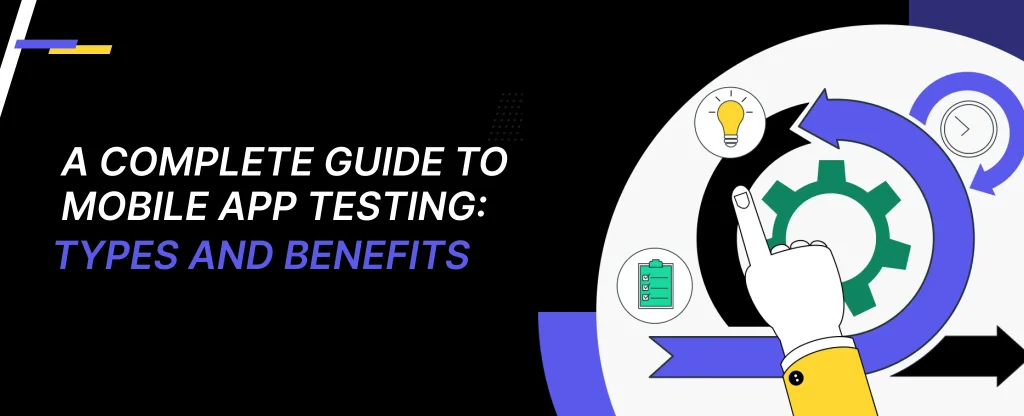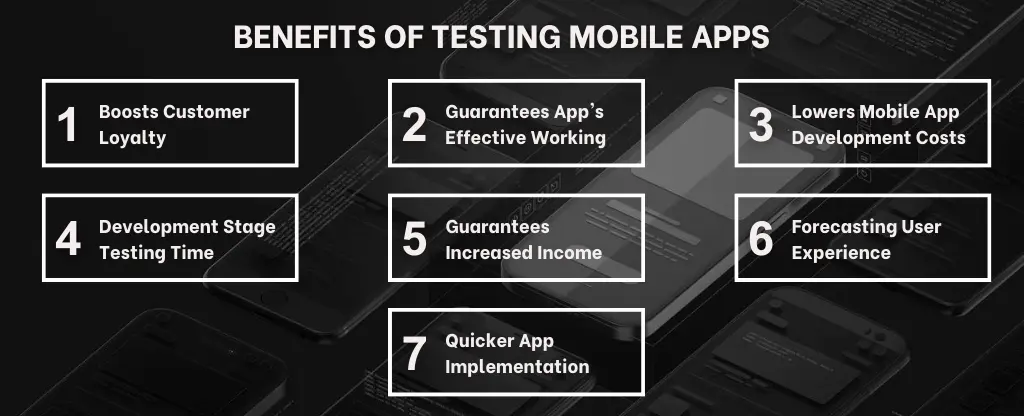A Complete Guide To Mobile App Testing: Types And Benefits
30 Nov 23 


Do you want to create a mobile application that differentiates you from your rivals? You only need to look at thorough mobile app testing! Giving users an impeccable experience is crucial in the current digital transformation era, when mobile apps have taken on a life of their own. Mobile app testing ensures your software runs seamlessly on various hardware and operating systems and gives consumers an outstanding user experience.
The need for mobile apps is increasing, as is the significant rise in mobile app development companies. There are various factors to consider before the mobile app development process, which are crucial to the overall performance of the app. Therefore, before releasing your app, conduct thorough testing to find and fix any potential problems. Your mobile app can be thoroughly tested to reduce risks, improve performance, and protect your company’s reputation.
We will examine various mobile testing tools in this content plan, which are essential for confirming the features and calibre of your mobile application. We will walk you through every step of the testing process, from functional efficiency to integration to security testing, and provide you with the expertise you need to ensure your app succeeds in the highly competitive app market.
Why Carry Out Mobile App Testing?
An app can only be wholly beneficial and problem-free if you and the user are satisfied with its functions. Your company’s conversion rates, credibility, and branding may all suffer very quickly if the app is a failure.
To understand why mobile app testing is necessary, look at the following figures.
- Roughly 71% of app uninstallations are typically the result of app crashes.
- Approximately 50% or even more of downloaded apps have yet to be used.
- Furthermore, about 70% of the population gives up on the app because it requires a lot of work.
- Moreover, roughly 65% of consumers avoid companies that provide subpar mobile encounters.
- When an app doesn’t deliver its anticipated worth, approximately 29% of users stop using it immediately.
Having read the statistics above, you may have yet to understand the need for app testing. A well-tested app provides positive user experiences. You, therefore, must attend and take it. Customers of mobile apps quickly remove those that freeze, crash, load slowly, or give a disappointing user experience. It results in negative app store reviews.
Correcting mistakes in an application after it has been installed on an individual’s gadget would take a lot of time, as would revising the app for the store and waiting for customers to download it. Thus, it’s necessary to carry out efficient testing to reduce problems and improve the app’s overall performance. Customers will become more involved with the app, and feedback and ratings will increase.
You should test the apps to evaluate their efficiency, accessibility, and usefulness solely for this reason. Users stay away from using apps that drain their device’s battery or provide useless data. Applications should react to various events, such as turning off or on the device, going into airplane mode, and connecting to or unplugging from WiFi, Bluetooth, or USB.
Mobile App Development Platforms To Test
Typically, three types of mobile app platforms are required for testing:
1. Responsive Web Apps
They are made to be easily accessible via a mobile device and mobile browser, as their name implies. Responsive web apps can be Progressive Web Apps (PWAs) or just highly flexible and enhanced variations of websites. They function flawlessly on all desktop and mobile platforms. Usually, frameworks like HTML, CSS, and JavaScript are used to create PWAs.
2. Native Apps
Native applications are usually downloaded and installed through various play store platforms. This includes such as the Google Play Store or Apple App Store and are designed exclusively for the Android or iOS mobile platforms. It includes cross-platform native apps created with frameworks like NativeScript, Flutter, and React Native. Also includes native apps created in Objective-C/Swift for iOS or Java/Kotlin for Android.
3. Hybrid Apps
Although hybrid apps are created with web technology, we install them on our gadgets like native apps. These applications use the browser engine on the gadget to execute JS locally and deliver HTML. Simultaneously, it includes while operating within a native container.
Types of Mobile App Testing
Different app testing methods ensure your app is tested from every perspective, ensuring you deliver the highest possible solutions. For your app to continue working flawlessly after launch, you must typically test it for anticipated performance, uniformity, and friendliness.
Let’s examine the different kinds of testing and the topics they cover.
1. Manual Testing
Manual testing is performing software tests by hand without the assistance of automation tools. The main goal of manual testing is to find mistakes and flaws. Thereby ensures that the product is free of bugs. Developers typically choose this testing strategy to test particular features early in the product development cycle.
For instance, when beginning an eCommerce app website, you must evaluate many things. This includes quick loading times for high-resolution photos, a seamless payment process, social media channel links, etc.
Manual Testing Types
- White Box Testing
Before sending the code to the QA team, the programmer runs this testing to ensure everything works. White box testing is so named because developers can view the code while it is being tested.
- Black Box Testing
The test engineer does this testing to ensure the program or app works as the consumer expects. It’s called “black-box” testing since this code is hidden during testing.
- Gray Box Testing
Gray box testing is testing that combines black box and white box methods. This kind of testing can be done by someone who understands testing and coding.
2. Automated Testing
Testers employ an automated test situation when an app is finished being developed. This considers the end user’s viewpoint to evaluate the efficiency, accessibility, and overall performance of the app. Automated testing tools are a type of software testing. It aids in running a test case suite to find flaws in the system.
In contrast to manual testing, you’ll ideally set up an unlimited number of test plans for mobile applications. This is when using an automated testing approach. But ensure that you automate the most prevalent test scenarios. These are the easiest to set up, yield foreseeable outcomes, cannot be tested manually, and can run on multiple devices.
This method typically makes a comparison between actual and expected results. Furthermore, it makes functional and non-functional testing easier. In certain situations, manual testing is the only practical choice.
However, certain QA tests may be overly complex or extensive for human testers to manage independently. Consequently, a combination of automated and manual testing is employed to guarantee the highest possible quality for the application.
Areas of Mobile App Testing
1. Performance Testing
This is a non-functional app testing method. It evaluates a software application’s response time, quickness, security, dependability, resource consumption, and adaptability under a given workload.
Hence, it aims to locate and eliminate the software application’s performance obstacles.
It ensures:
- Reaction time for various kinds of queries
- Managing greater weight and caliber.
- App behavior when multiple users are working at once.
- Prolonged functionality at a typical load.
Types of Performance Testing
- Scalability Testing
It establishes how well the app scales to accommodate growing user loads.
- Stress Testing
It involves putting an application through rigorous workload testing to see how well it manages intense usage and data handling. The goal is to identify the breaking point of the application.
- Volume Testing
Volume testing monitors how the application behaves when a database is filled with much data.
- Spike Testing
This evaluates how the program responds to an unforeseen spike in traffic.
- Load Testing
Load Testing evaluates the app’s ability to function under typical user loads. Before the app goes live, performance bottlenecks are to be addressed.
- Endurance Testing
It guarantees the app can withstand anticipated traffic for an extended period.
2. Functional Testing
The purpose of functional software testing is to ensure that the mobile application is operating as intended. Functional testing ensures that each function is adaptable and adheres to the necessary standards. This can be by concentrating on the main goal and the mobile app’s flow.
3. Usability Testing
Usability testing, also known as user experience testing or UI testing, is a popular method. This assess an application’s intuitiveness for novice users. The overall enhanced user experience is the primary aim of usability testing. This also looks for bugs and methods to improve users’ feelings.
4. Localization Testing
Ensuring that an application is readily available to all consumers, irrespective of where it’s available in the marketplace, is crucial. Whether supporting various dialects or displaying the amount in their local currency. Localization testing can be helpful in this situation.
Consumers nearly never engage with apps that have graphical or user interface elements that are not culturally appropriate. Today, customers demand effortless interactions tailored to their requirements. Unfortunately, due to insufficient resources or testing scenarios, it remains one of the most overlooked testing phases.
5. Compatibility Testing
Compatibility testing is a non-functional evaluation. This is helpful to test a mobile application’s ability to perform its tasks smoothly across a range of network settings. These settings include hardware configurations, and OS systems.
6. Installation Testing
Also known as “implementation testing.” Through testing, it is determined how well the software is installed and uninstalled correctly. Additionally, installation testing assists us in guaranteeing error-free and unaltered changes.
7. Security Testing
Certain apps, irrespective of the application category, will request confidential data from the end-user. For example, when the consumer creates a user profile. Ensuring the application’s confidentiality, authenticity, and integrity is crucial to safeguarding the data. Therefore, during QA testing, special attention to be given to privacy concerns. The program’s actions should undergo testing under various device authorization plans.
Benefits of Testing Mobile Apps

1. Boosts Customer loyalty
Client happiness will increase if an app is easy to use and functions correctly. In this sense, analytics aid in expanding the audience and fostering the positive reputation of the sector.
2. Guarantees App’s Effective Working
The main goal of the quality assurance process is to confirm that the app is operating without a hitch. Additionally, QA experts check if people can download an app to multiple devices without issues. They test apps on hardware to ensure the final product operates as intended.
3. Lowers Mobile App Development Costs
Automated app testing can reduce the cost of mobile app development projects when applied effectively. The main factor in reducing costs and reducing the number of bugs discovered after implementation is thorough testing.
4. Removes Testing Time in the Development Stage
Manual testing requires substantial employee and time investment. Analysts quickly gain the ability to run a variety of tests. Automated testing increases the effectiveness and speed of testing, representing its main advantage.
5. Guarantees Increased Income
Testing may incur upfront costs. Nevertheless, it obviates the necessity to rectify problems and reconstruct a product in subsequent stages. Thereby saving time, cutting overall costs, and facilitating a swift time to market. Collaborating with your testing experts can contribute to anticipating better reviews in the future.
6. Forecasting User Experience
Here, the experts evaluate a solution’s appearance and feel by placing themselves in the end users’ shoes. They utilize an app to test if the navigation is clear and straightforward. It also assesses the simplicity of using the app for customers in various scenarios. This enables forecasting whether users will continue using the app or opt to remove it from their phones.
Releasing an app with flawed features leads to negative user feedback, app uninstalls, and a tarnished reputation for your company. Thus, remember the importance of testing your app from the beginning of its development process.
7. Quicker App Implementation
Nevertheless, when combined with the Agile development process, automated testing helps create apps more quickly. This includes with better outcomes and a higher return on investment. App deployment happens more rapidly due to automation testing’s reduction of the mobile app development life cycle.
Summing Up
In the unlikely scenario that your product is defective, you will probably lose clients. This is the rationale behind the crucial significance of mobile application testing. Building an exceptionally adaptable, intuitive, and bug-free application is essential to establishing yourself in the marketplace. Thereby, obtaining an edge over rivals.
Do you believe you need the resources and abilities needed to complete the task?
If you want to test your app without problems, choose the right mobile app development company. Accordingly, the testing professionals will also support you during the entire app testing process.
Mindster is, therefore, the right choice for you. We are a top-notch mobile app development company with 13+ years of experience crafting stunning and intuitive mobile app solutions through our expert and passionate developers and UI/UX Design team. Thus, you are free to start your app testing journey since you understand how to evaluate a mobile app at this point in the post.
Thus, get in touch with us for further clarifications and details.
- Agentic AI1
- Android Development3
- Artificial Intelligence38
- Autopay1
- Classified App3
- Custom App Development5
- Digital Transformation12
- Doctor Appointment Booking App14
- Dropshipping1
- Ecommerce Apps40
- Education Apps2
- Fintech-Apps38
- Fitness App4
- Flutter4
- Flutter Apps20
- Food Delivery App5
- Grocery App Development1
- Grocery Apps3
- Health Care10
- IoT2
- Loyalty Programs11
- Matrimony Apps1
- Microsoft1
- Mobile App Maintenance2
- Mobile Apps132
- On Demand Marketplace1
- Product Engineering6
- Progressive Web Apps1
- React Native Apps2
- Saas Application2
- Shopify9
- Software Development3
- Taxi Booking Apps7
- Truck Booking App5
- UI UX Design8
- Uncategorized7
- Web App Development1



















Comments